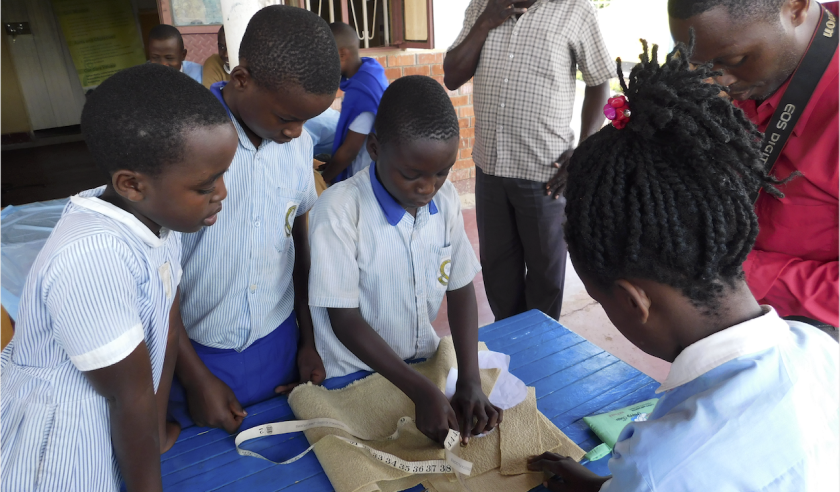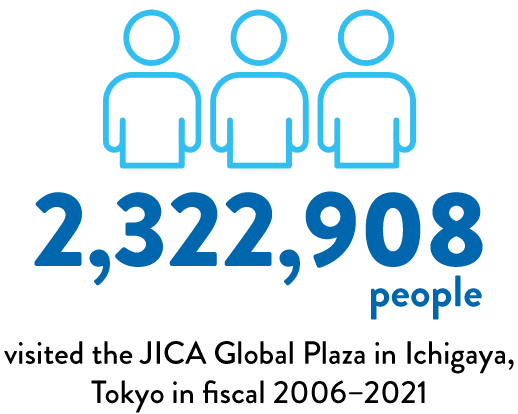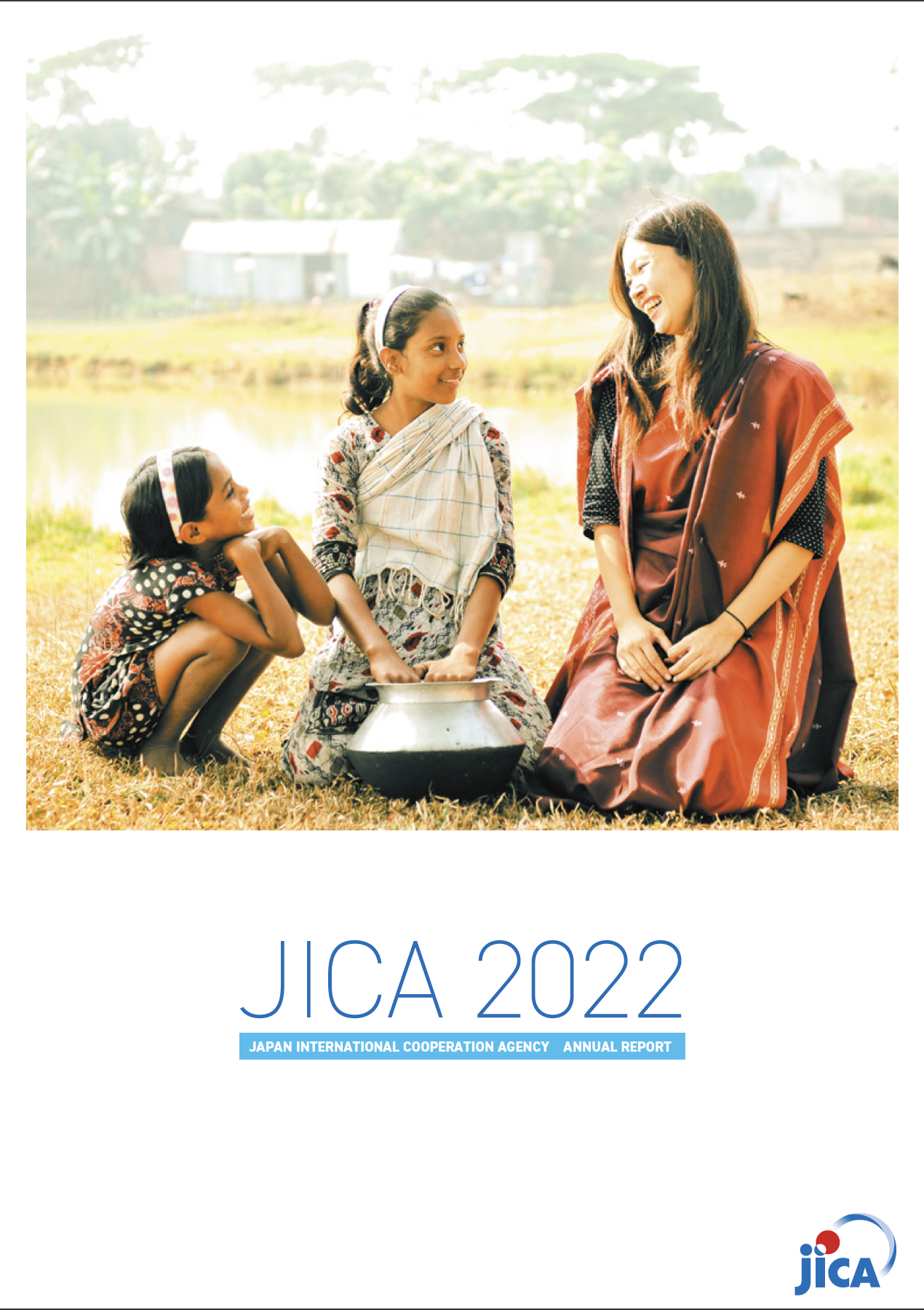partnership
Collaboration with Civil Society

For Attentive Cooperation by Various Actors
In the field of citizen participatory cooperation, JICA focuses on (1) helping developing countries to address their development issues in cooperation with Japanese citizens, (2) promoting public understanding of international cooperation and encouraging public participation in it, and (3) utilizing JICA’s experiences in international cooperation for the benefit of local communities in Japan. Among these activities, partnerships with NGOs and other organizations and local governments as well as support for development education are introduced below.
Partnerships with NGOs and Other Organizations
Through dialogue, JICA works to strengthen partnerships with NGOs and other organizations and to provide capacity-enhancement support for them. It is also engaged in collaboration with them to address development issues facing developing countries.
1. Dialogue
JICA provides several platforms for dialogue for different purposes. In fiscal 2021, JICA continued to arrange the nationwide NGO-JICA Dialogue Meeting as well as regional meetings designed to deepen discussions focused on regional issues. As in fiscal 2020, JICA also held NGO-JICA study meetings aimed both at sharing information on specific topics and at exploring more opportunities for cooperation.
2. Capacity-enhancement support
JICA offers capacity-enhancement training in organizational management and project execution to NGOs and other organizations to support their effective international cooperation activities. It also operates the NGO-JICA Japan Desk in 27 developing countries to provide NGOs and other organizations based in Japan with information on their counterparts in these countries.
3. Collaboration
JICA implements JICA Partnership Program (JPP) projects jointly with NGOs and other organizations by taking advantage of their expertise and experience in order to support the socioeconomic development of developing countries. In fiscal 2021, a total of 31 JPP projects were adopted. Separately, JICA adopted 16 such projects financed by the JICA Donation Fund for the People of the World, which receives donations from citizens, companies, and organizations. During fiscal 2021, the pandemic continued to make international travel to partner countries difficult. Nevertheless, JICA continued its operations by resorting to alternative implementation processes, including online technical guidance.
Partnerships with Local Governments
JICA is also engaged in activities that not only contribute to developing countries but also serve to vitalize regional areas in Japan. In this regard, local governments are particularly important partners of JICA. JICA works with local governments to implement projects proposed by them in developing countries. It also supports local communities in conducting international cooperation activities and developing global human resources through coordinators for international cooperation that JICA assigns to regional councils for international relations and other organizations across the country.
Through these activities, JICA encourages overseas activities of local governments and companies and helps to internationalize the regions. JICA employees on loan to local governments help them to address issues of their own by capitalizing on the expertise and experiences such employees gained through JICA’s cooperation in developing countries. Recently, local governments and other regional actors have made more use of JICA’s know-how and networks in supporting coexistence with foreign nationals, promoting the SDGs, and taking part in the Host Town Initiative for the Tokyo 2020 Olympic and Paralympic Games.
Development Education
JICA Global Plaza
JICA’s three Global Plazas—the JICA Global Plaza in Ichigaya, Tokyo; the Nagoya Global Plaza in Nagoya City, Aichi; and the Hokkaido Global Plaza in Sapporo City, Hokkaido—offer hands-on exhibitions that encourage seeing, listening, and touching. Visitors can receive explanations from Global Concierges, who have abundant experience in international cooperation. These Global Plazas offer the opportunity to learn about the realities in developing countries and the challenges facing the global community as well as international development cooperation at work, while encouraging visitors to think about what they learned and even translate it into action.
In fiscal 2021, many events and seminars moved online due to the pandemic, attracting numerous participants even from remote areas. Other JICA domestic offices also provide a wide range of information on international cooperation for the public.

Promotion of development education at schools
JICA conducts activities aimed at promoting development education at school. The idea is to foster the abilities of students and pupils to (1) understand how development challenges facing the world relate to Japan, (2) regard them as their own problems, (3) proactively study them, and (4) participate in efforts to overcome them. Specific activities include working with such actors as boards of education, teachers and school administrators to (1) organize training sessions and seminars for teachers, (2) produce and provide teaching materials, and (3) deliver lectures on international cooperation upon request.
JICA, with its ample expertise, information, and human resources in international cooperation, has an ever increasingly larger role to play in school education in the effort to foster creators of a sustainable society as called for in the New National Curriculum Standards, which came into effect in fiscal 2020.
Header photoUganda: The Global Bridge Network (GBN), a nonprofit organization based in Japan, worked with a local NGO to provide training in making reusable cloth sanitary pads in a collaboration project with JICA. The idea was to help create an environment where schoolgirls can go to school without feeling uncomfortable even during their period so that they can complete basic education. GBN also conducts awarenessraising activities regarding hygiene, sex education, and gender. (Photo: GBN)
More Information :
JICA’s website: Civil Participation![]()
JICA Partnership Program![]()
JICA Global Plaza![]()

JICA Annual Report 2022